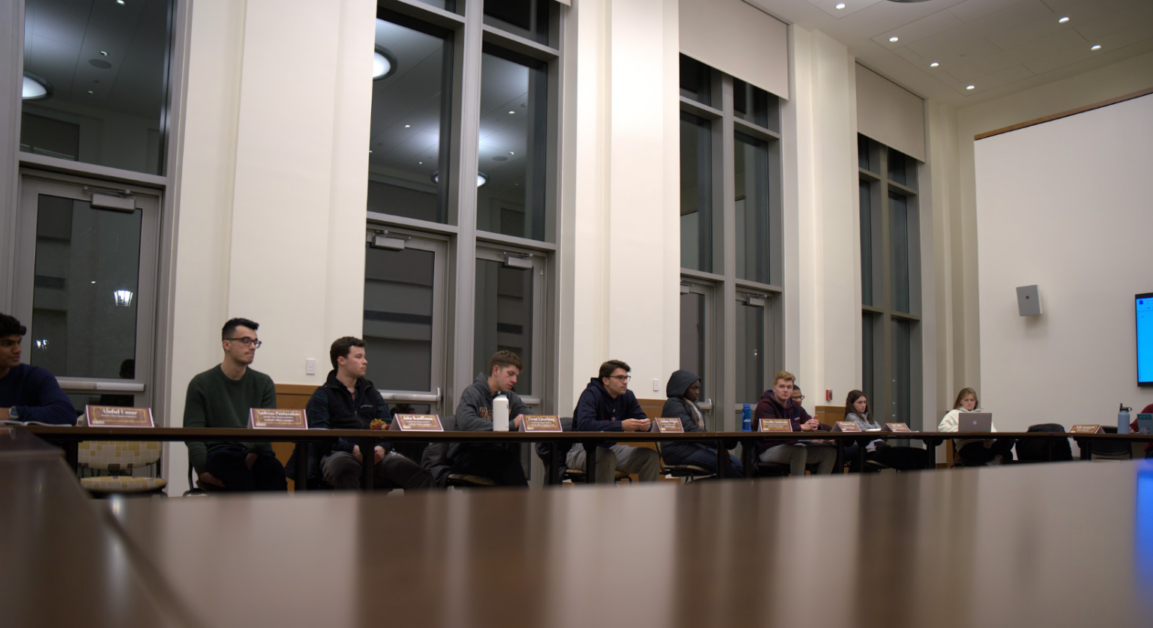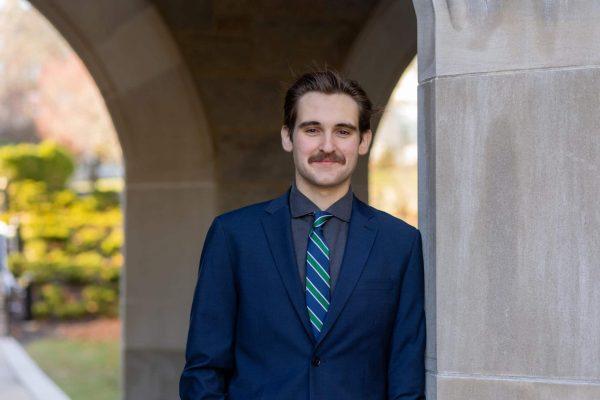The Student Assembly (SA) voted to pass a $377,500 UGBC budget for the 2023–24 academic year during its meeting on Tuesday night, increasing last year’s budget by $15,050.
Jonah Kotzen, UGBC president-elect and MCAS ’24; Meghan Heckelman, UGBC vice president–elect and LSEHD ’25; and Sahithi Thumuluri, GLBTQ+ Leadership Council (GLC) financial coordinator and MCAS ’25, presented the budget to the SA at the meeting.
All present SA representatives voted to pass the proposed budget except for Community Relations Chair Joshua Golden, MCAS ’25, and Student Life Committee Chair Thompson Penn, CSOM ’25, who each abstained.
Heckelman said she, Kotzen, and Thumuluri needed the SA’s approval for the budget before presenting it to Jonathan Hinrichs—director of finance and operations in the Division of Student Affairs—next week.
The budget is broken down into the eight divisions of UGBC: Executive Council, Communications, Student Initiatives, SA, Environmental Sustainability, the AHANA+ Leadership Council (ALC), GLC, and the Council for Students with Disabilities (CSD).
Executive Council — $78,300 ($22,550 increase)
UGBC’s Executive Council saw the largest increase for the coming year’s proposed budget, with a 40.45 percent growth from its allotted amount for the 2022–23 academic year.
The most costly line items in the budget are the Office of Student Involvement graduate stipend ($23,250), the UGBC leadership stipend ($10,000), as well as Dinner and Dialogue events and the President’s Roundtable Conference ($6,000 each).
“Part of the reason you see the increase from last year to this year for Exec. Council is there are line items that we hadn’t included in previous years that we had contributed to that we have now made into line items,” Thumuluri said. “An example of that is Marathon Monday as well as the end-of-year banquet.”
Heckelman added that another reason for the increase in the Executive Council’s budget was that Dinner and Dialogue events and the President’s Roundtable Conference were formally a part of the Student Initiatives budget.
The Executive Council’s budget also includes a $4,000 stipend for the UGBC president, a $3,500 stipend for the UGBC vice president, and $9,500 of discretionary funds.
Communications — $6,150 ($1,000 decrease)
The proposed budget for UGBC’s Division of Communications will decrease by 13.99 percent for the 2023–24 year.
The budget includes $2,000 for flyers and posters, $2,000 for outreach merchandise, and $2,000 for UGBC merchandise.
The decrease from last year’s budget stems from UGBC’s reduced use of flyers, according to Kotzen.
“We have noticed that a lot of our marketing—just by nature of technologies—moved digital, and so we kind of wanted to reflect that in the budget,” Thumuluri said.
Golden suggested that UGBC consider removing funds from the merchandise allocation, instead distributing them elsewhere in the budget.
Heckelman responded that while she understands Golden’s hesitations to support financing merchandise for UGBC’s members, she thinks the merchandise makes UGBC’s presence on campus and at events more visible and significant.
“I think that having that physical presence that people can see for the relatively small expense of $2,000 that you see as opposed to the broader budget is important,” she said.
Student Initiatives — $52,500 ($6,200 decrease)
The Division of Student Initiatives’ budget will be reduced by 10.56 percent in the proposed 2023–24 budget.
The most expensive line items from the Student Initiatives budget are women and gender initiatives ($12,000), civic engagement events ($10,000), and athletic collaborations ($10,000).
Heckelman said the women and gender initiatives allocation would go toward supporting the annual Women’s Summit as well as assisting the Women’s Center in its efforts to keep feminine hygiene products stocked on campus.
“We think that they should just be restocked like toilet paper and soap and other necessities like that,” Heckelman said.
The budget also includes $8,500 of discretionary funds for Student Initiatives.
Student Assembly — $2,900 ($3,000 decrease)
The SA had the largest portion of its budget reduced, receiving 50.85 percent less than the year prior.
The two line items in the SA’s allocation are Senator Initiative Programming ($2,400) and a Senators’ Dinner ($500).
Kotzen attributed this decrease to the SA not spending its allotted $5,900 for the 2022–23 academic year.
“That also doesn’t mean that the SA is restricted to this 2,400,” Kotzen said. “If they wanted to request money from, you know, like the [Executive Council] discretionary funds, that could be possible.”
Environmental Sustainability — $17,350 ($3,500 increase)
UGBC’s Division of Environmental Sustainability saw a 25.27 percent increase of its funds in the proposed budget.
The division’s most costly line items are Green Week ($4,000), an environmental speaker ($3,000), a composting bin program ($1,500), and a Valentine’s Day flower event ($1,500).
Thumuluri explained that some line items, such as the Valentine’s Day flower event, had been funded by UGBC in the past, though not included in the official budget, and that part of the increase was a result of their official allocation in this year’s budget.
The division is also allocated $4,050 of discretionary funds.
AHANA+ Leadership Council — $131,000 ($1,000 decrease)
Though the ALC saw a 0.76 percent decrease in this year’s proposed budget, it continues to receive the largest allocation of UGBC’s overall funds.
The most expensive line items from ALC’s budget are ALC Showdown ($65,000), ALC Ball ($45,000), and speaker allocations ($10,000).
Kotzen explained that while ALC Showdown and ALC Ball had received $60,000 and $50,000 respectively in the past, this year’s budget shifted more funds toward Showdown.
“ALC has expressed wanting to have like a bigger performer at Showdown while judges are deliberating, for example,” Kotzen said. “So, we’re trying to do that.”
Kotzen added that the speaker allocations were reduced from last year’s budget because the ALC had not used all of the funds.
The ALC is also given $3,750 of discretionary funds.
GLBTQ+ Leadership Council — $54,800 ($3,700 increase)
The GLC is given a 7.24 percent increase of allocated funds in this year’s proposed budget.
The highest costing line items are the GLC Formal ($30,000), speaker allocation ($5,000), and the Born This Way Cafe ($3,000).
Thumuluri said GLC’s budget was increased because it needed to move into rollover funds to cover the GLC Formal last year.
“We saw enough attendance and ticket sales in order to justify an extension of that event,” she said.
The GLC is given the largest amount of discretionary funds, with an allocation of $11,000.
Council for Students with Disabilities — $34,500 ($3,500 decrease)
The CSD received a 9.21 percent decrease in its funds for the year’s proposed budget.
The most costly line items are the speaker allocation ($10,500), CSDisco ($10,000), and Dinner in the Dark ($4,000).
The CSD is given $4,000 of discretionary funds.
According to Thumuluri, the overall decrease can be attributed to cuts to the discretionary funds as well as small cuts to line items to supplement other increases.
What’s to Come
With their proposed budget passed through the SA, Kotzen and Heckelman’s plan will be reviewed by Hinrichs in the Division of Student Affairs next week. If it is approved there, the budget will become official for the 2023–24 academic year.
As the meeting came to a close, Heckelman thanked the present SA representatives for their time and dedication.
“Thank you all for being here, I know it’s tough, everyone has finals and things that are happening, but your commitment to being here tonight really shows,” she said.








